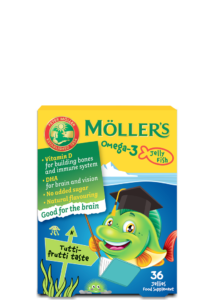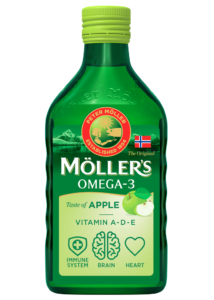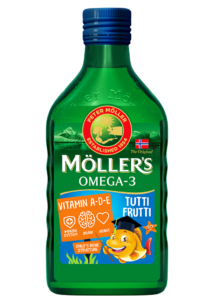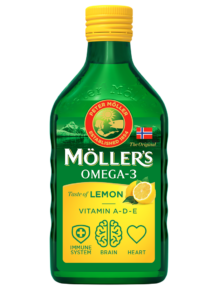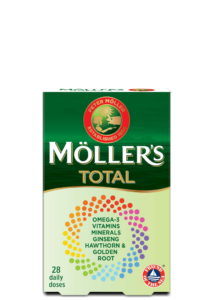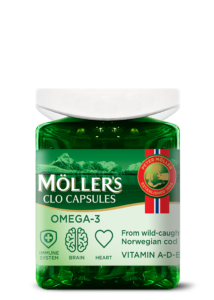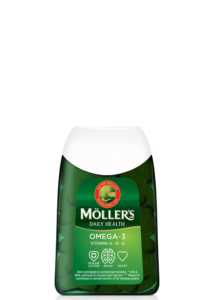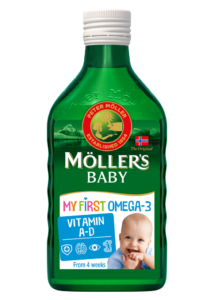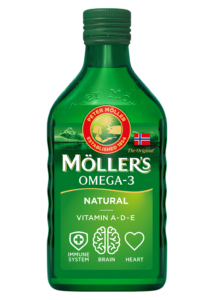Sufficient intake of omega-3 is essential to maintain normal body functions and processes and this is even more important when you are pregnant.
Home » Pregnant? Then omega-3 is even more important

Read more articles about omega-3 here
Omega-3 in pregnancy
Caring for your child starts the day you find out you’re pregnant, so it’s no wonder you’re more concerned about what you eat than usual. Your diet is also your baby’s diet, and it’s more important during this period than ever to have a healthy and varied diet, with good, safe sources of omega-3 fatty acids.
Omega-3 for the brain and eyes
The European Food Safety Authority (EFSA) recommends that pregnant women have a daily intake of 200 milligrams of the fatty acid DHA. DHA is found in oily fish like salmon, trout, herring, mackerel and sardines. Some omega-3-rich foods like smoked salmon and raw tuna (sushi) are not recommended during pregnancy due to the risk of listeria bacteria, which might harm your unborn baby. Listeria can grow in food that hasn’t been heated, such as smoked salmon and raw tuna. When you’re pregnant, you should also avoid roe and liver pâté due to the risk of toxins. Omega-3 fatty acids contribute to normal development of the foetus’s brain and eye functions, which is why Omega-3 is so important. A lot happens to your baby’s development during the 40 weeks of gestation, and your unborn baby is subject to your choices. This also applies after the birth, when your baby is being breast-fed and thus continues to get nutrients from you.
A safe pregnancy
When you’re pregnant, it’s only natural that you want the very best for your baby. Like most mothers-to-be, you probably, spend more hours than usual searching for information online. You want to make safe decisions based on research and rigorous testing rather than just buying the first thing you come across. This applies to everything from choosing a baby monitor to dietary supplements. When you choose omega-3 supplements, it’s important to keep in mind that not all suppliers have the same high standards in their manufacturing of omega-3 products. Be sure to choose a manufacturer with high standards in their quality control throughout the entire manufacturing process. Only the very best is good enough for you and your baby!
What is good health?
Do you have a good lifestyle?
Lifestyle simply means the way in which you live. Health and lifestyle go hand in hand. You might feel you have a good lifestyle if you are physically active, eat healthily and generally experience a sense of wellbeing. Conversely, if you want good health you should also have a good lifestyle.
Physical activity is the major contributor to a good lifestyle, but diet, drugs, stress, sleep and social conditions are also play an important role. Being able to use the body properly to avoid injury also affects lifestyle. Physical activity can also prevent depression and help you to recover more quickly from mental illness, both of which obviously affect your lifestyle.
Diet can be a difficult topic for many. Perhaps you eat too much or too little or maybe you find it hard to know what foods to combine to have a balanced diet. It’s also important to eat food that contains important vitamins, minerals and dietary fibre, omega-3 and antioxidants. On top of all this, you also need to get enough energy, protein and the correct fatty acids. The requirement for these nutrients changes throughout your life. When you are older you also have different requirements than children and younger adults. Women also have different requirements than men. Pregnant and breastfeeding mothers also have special requirements.
When you get older, you lose muscle mass and your body requires less energy and therefore less food. You may lead a less active life than you did before, which is why you require less food. However, your need for minerals, vitamins and other nutrients remains the same. Of course, there are plenty of healthy and active older people, but when you reach 70 to 80 years of age, it’s easier to become ill, especially during flu season.
Some steps you can take to improve your lifestyle and health are to:
- eat a healthy and varied diet
- stay active
- watch your weight
- avoid too much alcohol and don’t smoke
- get enough sleep
- think positive
- practise good hygiene
What is good quality of life?
The World Health Organisation (WHO) defines quality of life as a state where the individual can realise their potential, cope with normal stressful situations, work in a rewarding and positive way, and be able to contribute to others and society.
Quality of life is a wide and somewhat diffuse concept that includes joy in, and a desire for, life. These are values that are rather felt than measured, which in turn are based on personal environment and choices. Quality of life doesn’t necessarily depend on being healthy or sick. It’s the moments between worries, sorrows, problems and ailments that matter. For example, if you have a chronic illness, a feeling of mastery can be important when talking about quality of life.
To sum up, quality of life is a combination of health, lifestyle, networks and social support. It’s about experiencing joy, meaning in life, satisfaction, security and a sense of belonging, as well as being able to use your strengths. It’s also about feeling interest in life, coping with everyday situations and a being committed to something or someone. If you have good quality of life, you will be able to cope better with the inevitable stressful situations in life.
Our products
-
Möller’s Omega-3 Jelly Fish Cola
-
Möller's Omega-3 Jelly Fish Tutti Frutti
-
Möller’s Cod Liver Oil Apple
-
Möller’s Cod Liver Oil Tutti Frutti
-
Möller’s Cod Liver Oil Lemon
-
Möller's Total
-
Möller's Cod liver oil capsules
-
Möller’s Daily Health
-
Möller's My First Omega-3
-
Möller’s Omega-3 Jelly Fish Strawberry
-
Möller’s Cod Liver Oil Natural
Learn more
Exercise program for the elderly
Healthy Aging Healthy Bones
Healthy diet during pregnancy
Brain Healthy Aging
Good health, lifestyle and quality of life – What does it all mean?
Cod Liver Oil Healthy Aging
Get inspiration on our Instagram

